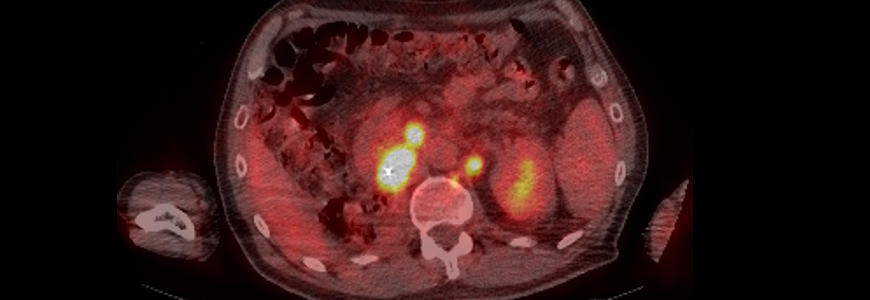Duke genitourinary (GU) oncology researchers are investigating whether a new sequencing of frontline treatment options is more effective than immunotherapy alone for patients with untreated metastatic clear cell kidney cancer with intermediate- or poor-risk prognosis.
The PDIGREE study, an adaptive phase III trial sponsored by the National Cancer Institute (NCI) and organized by the Alliance Cooperative Group, is comparing the standard-of-care immunotherapy combination ipilimumab and nivolumab followed by nivolumab monotherapy to ipilimumab and nivolumab followed by nivolumab with cabozantinib, an anti-angiogenesis agent.
Rather than waiting for disease progression to switch therapies, patients are randomized at the time of their three-month assessment: those with complete responses will go on to receive nivolumab monotherapy, those with progressive disease will go on to receive cabozantinib monotherapy, and those with stable disease or partial response will be randomized to either receiving nivolumab monotherapy or nivolumab with cabozantinib, with built-in, prospective treatment discontinuation at one year for participants who achieve complete responses.
Tian Zhang, MD, MHS, a Duke medical oncologist and national study chair, says because the kidney cancer treatment field has expanded so rapidly with new first-line therapies in the past year and a half, coordinated trials like PDIGREE will help clinicians determine which populations will benefit from the treatment and which combinations are smartest for sequencing treatment options.
“The novelty of PDIGREE as a study is that all of the first-line trials in kidney cancer until now have been compared against cohorts of patients treated with sunitinib as the control arm,” Zhang explains. “In this trial, there is no sunitinib control cohort, as everyone receives immunotherapy induction and then follows with this randomization, so it is in fact building on what we understand of immunotherapy to be beneficial for this population.”
The trial’s primary endpoint is to increase the three-year overall survival rates, and secondary endpoints include objective responses, progression free survival, and complete responses at the one-year mark, resulting in a break from treatment. Zhang notes that having better prospective sequencing data on one-year complete response rates will help clinicians make more informed decisions about treatment discontinuation.
“Most of our prior trials have run just until disease progression,” Zhang says. “No one has prospectively looked at when the right time is, how deep of a response you need, how we can try to give patients time off treatment as a potential for better quality of life, and whether those immunotherapy-induced responses will be durable off of treatment.”
Daniel J. George, MD, a medical oncologist also involved in PDIGREE as head of the renal cadre of the Alliance GU committee and director of the GU Oncology Program at Duke Cancer Institute, emphasizes that this study is patient goal-driven: “All of these drugs are FDA approved, so we are not testing for a new treatment indication here. Instead, we’re trying to build on the recent success of several different therapies to increase the number of patients who achieve a great treatment response, with no evidence of residual disease, because this is what patients really want—to be able to live off of treatment and to have their disease completely eradicated.”
Through PDIGREE and a rotating portfolio of diverse clinical trials for kidney cancer running at Duke, “we’re hopefully building a portfolio of studies in kidney cancer that will inform the next generation of patients,” George adds.
The successful initiation of this study also highlights the strong mentoring relationship. George guided the overall study design in the initial national conversations, and Zhang is now study chair, leading this innovative study to improve outcomes for patients with metastatic kidney cancer. The study is currently enrolling patients across NCI National Clinical Trials Network sites.
